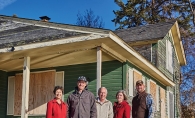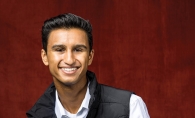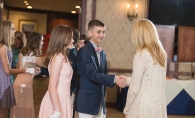The room buzzes with excitement as students and parents take their seats in Wayzata Central Middle School’s auditorium. This evening’s lecture is led by Massoud Amin, professor of electrical and computer engineering at the University of Minnesota. At tonight’s Young Scientist Roundtable (YSR), a discussion on the critical infrastructure of cyber-security is about to unfold.
Amin addresses the everyday conveniences that technology allows us to enjoy, as well as the potential disadvantages. Electronic and data systems are essential to daily life, but they can also pose a risk, he says, as networks can be breached by intruders. Using the Target security breach of 2013 as a recent example, Amin makes the topic relevant and applicable for his middle-school audience.
Often using illustrations like a chess board to explain a power grid, or how computer viruses and malware evolve and mutate from one piece of code to another, Amin creates a highly interactive learning experience. He asks for audience involvement, poses questions to his young learners, and listens intently to their replies. Vinod Padhye, one of YSR’s founding members who helped start the program when his children were in middle school, says one of the most important qualities of the guest speaker is to be able to communicate effectively with learners of all ages.
YSR, a Wayzata Public Schools program that’s been around for 25 years, is held on a weekday evening each month. It focuses on science, technology, engineering and math (STEM), with topics geared toward young learners. Students in grades K–12 are welcome, along with their parents and other community members. In particular, students get a chance to see what a future in a science-related field might look like.
This evening is Amin’s second appearance at YSR, and he’s a huge fan of the program. “Minnesota’s strong educational system has had a great output. Thanks to the efforts of this group, the percentage of students who grow up to go on to medical school, to engineering, to other things is really impressive,” he says.
Guest scientists have covered an array of subjects, from medical issues like leukemia to horticultural topics like the Honeycrisp apple.
Renae Lenhardt, a member of the planning committee, says YSR is unique because it gives students such personal interaction with experts. “They get to hear a scientist, talk to a scientist, and are quite frequently told to email them. You just can’t replicate that kind of experience,” says Lenhardt.
After the lecture, the roundtable portion of the evening occurs. Attendees can delve further by asking questions and having a discussion in an informal classroom setting. Tony Pappas attended the event for the first time in April with his dad, Thanasi. Tony enjoys science and math, which is why he wanted to attend. “I like technology because I’ve worked with coding before, and have made a couple projects with my dad and my uncle, so this is actually quite an interesting subject for me,” says Tony, who is now a sixth grader at Minnetonka Middle School East.
As a parent, Thanasi Pappas was impressed with YSR’s efforts to encourage a love of science. He enjoyed the presentation, too. “I appreciated Dr. Amin’s ability to explain the concepts to a younger audience. I know how dense some of these things can get, so I think he’s a pretty gifted speaker,” he says.
Leslie Hanson, a retired teacher and one of the founders of YSR, says the success of the program is largely due to the support it receives from the Twin Cities’ STEM community. “We have to credit the Twin Cities environment. There is such a wealth of people for us to approach: the University of Minnesota, General Mills, Cargill, Best Buy, Honeywell, Medtronic, 3M. There are so many wonderful places that give us resources,” Hanson says.
“For the kids, this is a great chance to get up-close and personal with someone in science. For them to say, ‘I could do that,’” says Lenhardt, “that’s really what it’s about.”









